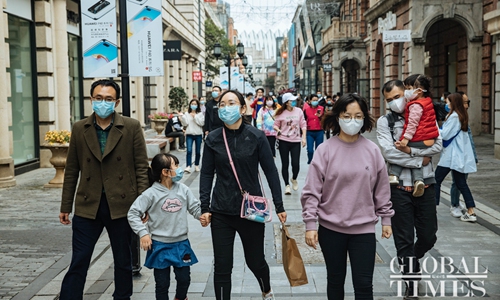SOURCE / MARKETS
Wuhan authority bans cashing in consumption vouchers, may discredit violators through blacklist

People walk to shop at the Chuhehan Street in Wuhan, Central China's Hubei Province on Sunday. The city announced to disburse 500 million yuan ($71 million) worth of "consumption coupons" to residents to help restart the economy after a two-month lockdown. Photo: Li Hao/GT
Residents and merchants in Wuhan, Central China's Hubei Province are now forbidden from cashing in consumption vouchers issued by local government and major online platforms, the commerce bureau of Wuhan announced on Wednesday.Anyone who violates the rule could be placed on a blacklist, the bureau said. The blacklist is part of China's broad efforts to build a nationwide social credit system. Any individual suspected of crimes will be handed over to the public security department.
"According to data from WeChat, Alipay, Meituan and resident reports, we found a few merchants and residents had cashed in their Wuhan consumption vouchers," the announcement said. The bureau has withdrawn these individuals' participation eligibility and handed relevant evidence to local police.
After life in the Chinese city hardest hit by the coronavirus began to return to normal, the Wuhan government, together with WeChat, Alipay and Meituan, on April 19 distributed consumption vouchers with an estimated total value of 500 million yuan ($70.7 million) to stimulate consumption and boost local economic recovery.
According to WeChat owner Tencent, the vouchers have generated 400 million yuan worth of consumption in the past month via WeChat Pay, 11.4 times the value of vouchers used.
However, local residents said some people had cashed in their consumption vouchers for personal gains.
A Wuhan resident said he had seen people attempting to purchase consumption vouchers for recreation and sports online, local media hbtv.com reported.
The resident joined a social media group and found that a voucher worth 50 yuan could be sold for 8 yuan, and an 80 yuan voucher could be sold for 12 yuan, the report said.
In order to standardize the release and usage of the consumption vouchers and maintain market order, Wuhan's commerce bureau has urged merchants to strengthen their social responsibility.
The authority has also called on local residents to report any similar behavior to local police.
From a legal perspective, there are different voices on such behavior, said Hu Wei, a lawyer at Beijing-based Globe-Law law firm.
He told the Global Times on Thursday that some saw the issuance of vouchers as a gifting process. "Once a consumer collects their voucher, it is the personal property of that consumer," Hu said.
But he added that others argued the purpose of issuing vouchers is to stimulate consumption and strengthen market vitality. "If a consumer cashes in a high-value voucher, he or she may be committing fraud," Hu warned.
Global Times


